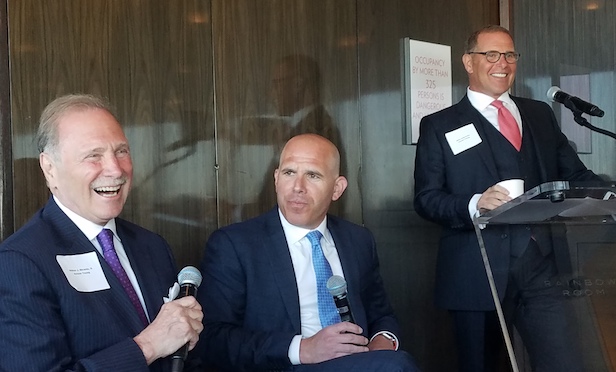
NEW YORK CITY—The CEO and chairman of RXR Realty, Scott Rechler, is bullish on New York City. But as the guest speaker at Avison Young's Midyear Market Report presentation, when asked what keeps him up at night, Rechler referenced Time magazine's, Sept. 17, 1990 cover, describing New York as “The Rotting of the Big Apple.”
“There was a time in the early 90s where we had crime issues that were overcoming our city,” said Rechler. “We're at a similar tipping point as it relates to our transit and congestion issues.”
In June 2017, Rechler was appointed to serve on the board of the Metropolitan Transportation Authority. In addition, he's the chairman of the Regional Plan Association. Rechler also formerly was the vice chair of the Port Authority of New York and New Jersey.
“We've gone decades with not reinvesting in our transit system and in our road system. We are now paying the price of a failing transit system and congested roads, like none of us could have ever imagined,” said Rechler. He noted the average speed of a bus in Manhattan is approximately four miles per hour. “If we don't get our arms around this issue of public transportation which has been the lifeline of our city, we will be at a tipping point where that quality of life starts to diminish.” He pointed to AllianceBernstein's decision to leave New York.
The RXR chairman endorsed the MTA's new president Andy Byford as a leader who could overhaul the MTA's infrastructure. But he said the challenge will require big money—tens of billions of dollars. “We have to suck it up and find a way,” said Rechler pointing to congestion pricing and gas taxes for potential assistance. “We need to find a way to fund this infrastructure or we're going to have serious problems on our hands.”
Nonetheless, Rechler voiced confidence in New York City's real estate. He said of all the markets in the world, Manhattan is in an incredibly enviable position as an idea-based economy. “The most important ingredient for success is talent and New York City is a magnet for talent. If you look at our population numbers, our job numbers, our tourism numbers, they are all at record highs.”
This drive to attract talent has led real estate activity such as Google's buying Cheslea Market, JPMorgan's building its new headquarters, and RXR's substantial renovations at 75 Rockefeller Plaza, according to Rechler. He added that at 75 Rock, RXR is building a restaurant and club on the top two floors.
“There's no way I would have thought we are going to take the top two floors of 75 Rock, which we thought would be the highest renting space and convert it to amenities for tenants. That's where the market is today,” said Rechler.
If not for the active construction such as the building of the World Trade Center, One Vanderbilt, and Hudson Yards and renovating Class A buildings in Midtown to basically create new buildings—there would not be the high levels of office demand exiting today, he further opined.
“We are at a state of equilibrium. You can't push rents beyond a certain point,” said Rechler. Looking at job growth and the increase in office space coming down the pipeline, there will be periods when offices will be emptied. However, he said that repeatedly, citing Sixth, Third and Park avenues and Lower Manhattan, that the offices have been backfilled.
“There has been enough demand to fill those submarkets. But you have to be prepared to ride through some of that softness that might come from there,” he said.
© Touchpoint Markets, All Rights Reserved. Request academic re-use from www.copyright.com. All other uses, submit a request to [email protected]. For more inforrmation visit Asset & Logo Licensing.







